PCI Compliance for Linux - OpenTelemetry

The PCI Compliance for Linux - OpenTelemetry is a unified log app that sends Linux log data to Sumo Logic via OpenTelemetry filelog receiver. The app's preconfigured dashboards help you to monitor system, account, and user activity to ensure that login activity and privileged users are within the expected ranges.
The PCI Compliance for Linux app covers PCI requirements 02, 07, 08, and 10.
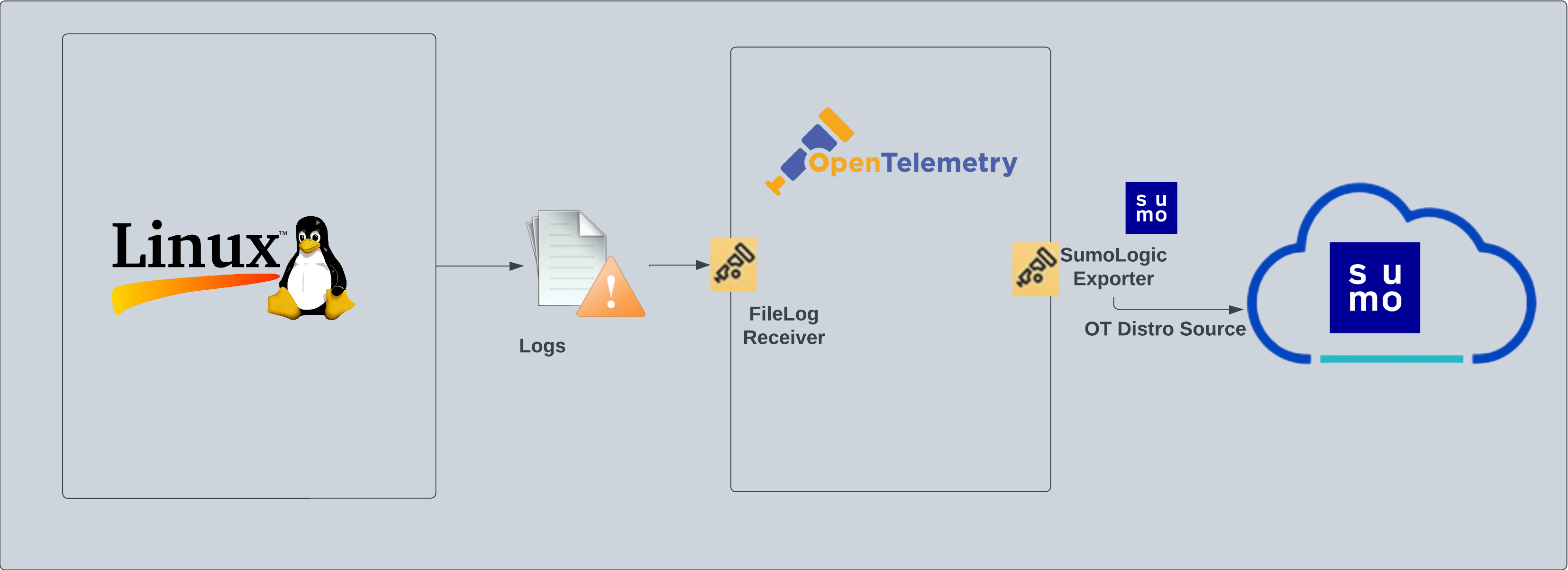
Fields created in Sumo Logic for Linux PCI Compliance
Following tag will be created as part of Linux app installation, if not already present.
sumo.datasource. Has a fixed value of linux.
Prereqisites
This app is based on the following log files from the Ubuntu Linux machine.
- auth.log
- syslog
- daemon.log
- dpkg.log
- kern.log
- CentOS, Amazon Linux, and Red Hat
- audit/audit.log
- secure
- messages
- yum.log
If you've already configured collection of these log files (for example, during Linux or Linux - Cloud Security Monitoring and Analytics app setup), then no additional log file collection is required. If any of the log files are missing, you can configure the missing file collection in the next step.
For logs collection
For Linux systems with ACL Support, the otelcol install process should have created the ACL grants necessary for the otelcol system user to access default log locations. You can verify the active ACL grants using the getfacl command. Install the ACL in your Linux environment, if not installed.
The required ACL may not be supported for some rare cases, for example, Linux OS Distro, which is officially not supported by Sumo Logic. In this case, you can run the following command to explicitly grant the permissions.
sudo setfacl -R -m d:u:otelcol-sumo:r-x,d:g:otelcol-sumo:r-x,u:otelcol-sumo:r-x,g:otelcol-sumo:r-x <PATH_TO_LOG_FILE>
Run the above command for all the log files in the directory that need to be ingested, which are not residing in the default location.
If Linux ACL Support is not available, traditional Unix-styled user and group permission must be modified. It should be sufficient to add the otelcol system user to the specific group that has access to the log files.
Collection configuration and app installation
You can skip this section if you have already set up the logs collection through Linux or Linux - Cloud Security Monitoring and Analytics app installation. Additional collection is not required as the logs used by this app are already ingested into Sumo Logic.
As part of data collection setup and app installation, you can select the App from App Catalog and click on Install App. Follow the steps below.
Step 1: Set up Collector
If you want to use an existing OpenTelemetry Collector, you can skip this step by selecting the Use an existing Collector option.
To create a new Collector:
- Select the Add a new Collector option.
- Select the platform where you want to install the Sumo Logic OpenTelemetry Collector.
This will generate a command that you can execute in the machine environment you need to monitor. Once executed, it will install the Sumo Logic OpenTelemetry Collector.
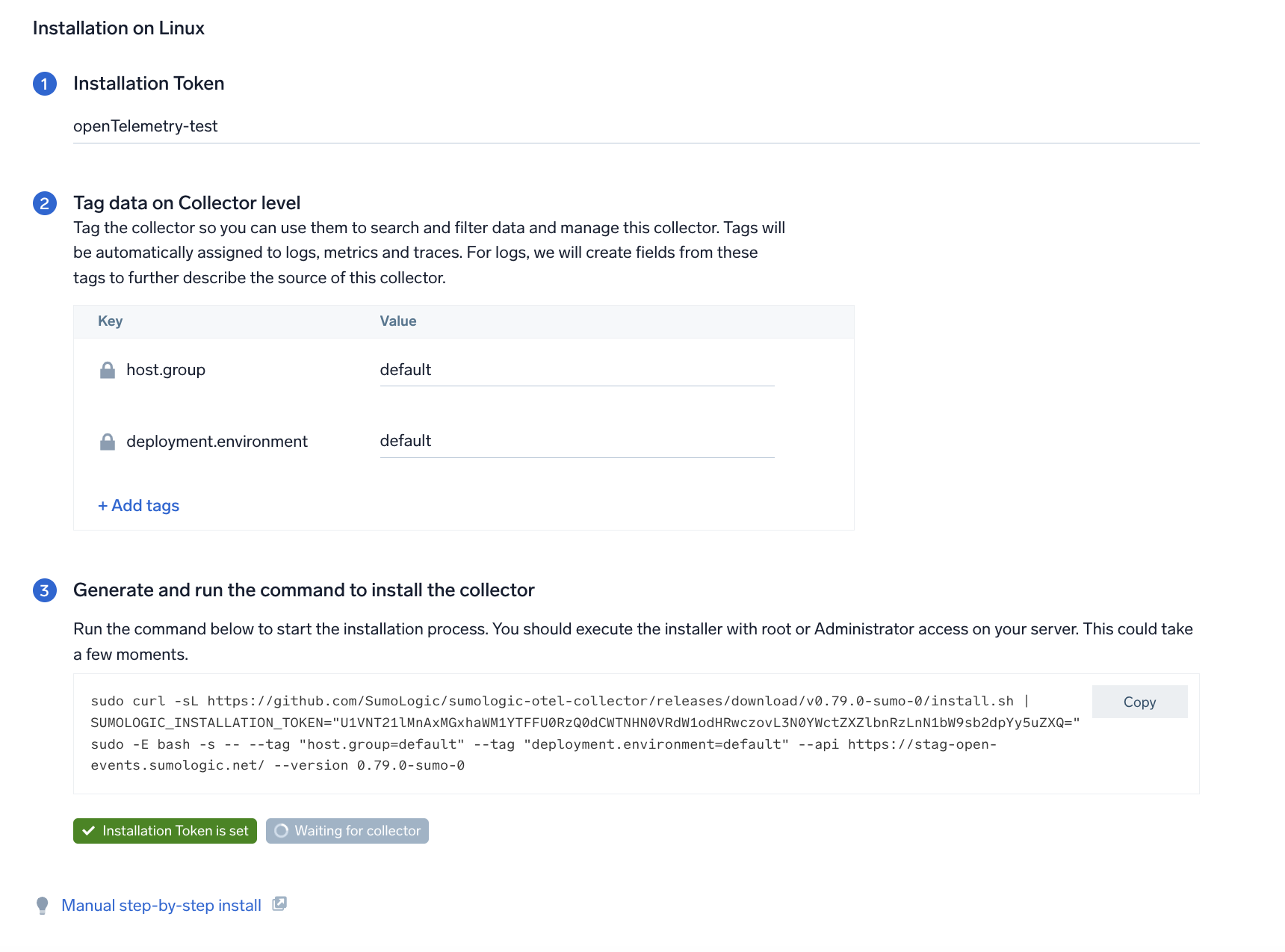
Step 2: Configure integration
In this step, you will configure the yaml required for Linux Collection. The app requires path for system log file based on the Linux version used.
Required Logs for Ubuntu
The following logs, located in the /var/log folder, are required for using the Sumo Logic app for PCI compliance for Linux with Ubuntu.
- auth.log
- syslog
- daemon.log
- dpkg.log
- kern.log
Required Logs for CentOS, Amazon Linux, and Red Hat
The following logs, located in the /var/log folder, are required for using the Sumo Logic app for PCI compliance for Linux with CentOS, Amazon Linux, and Red Hat.
- audit/audit.log
- secure
- Messages
- yum.log
Click on the Download YAML File button to get the yaml file.
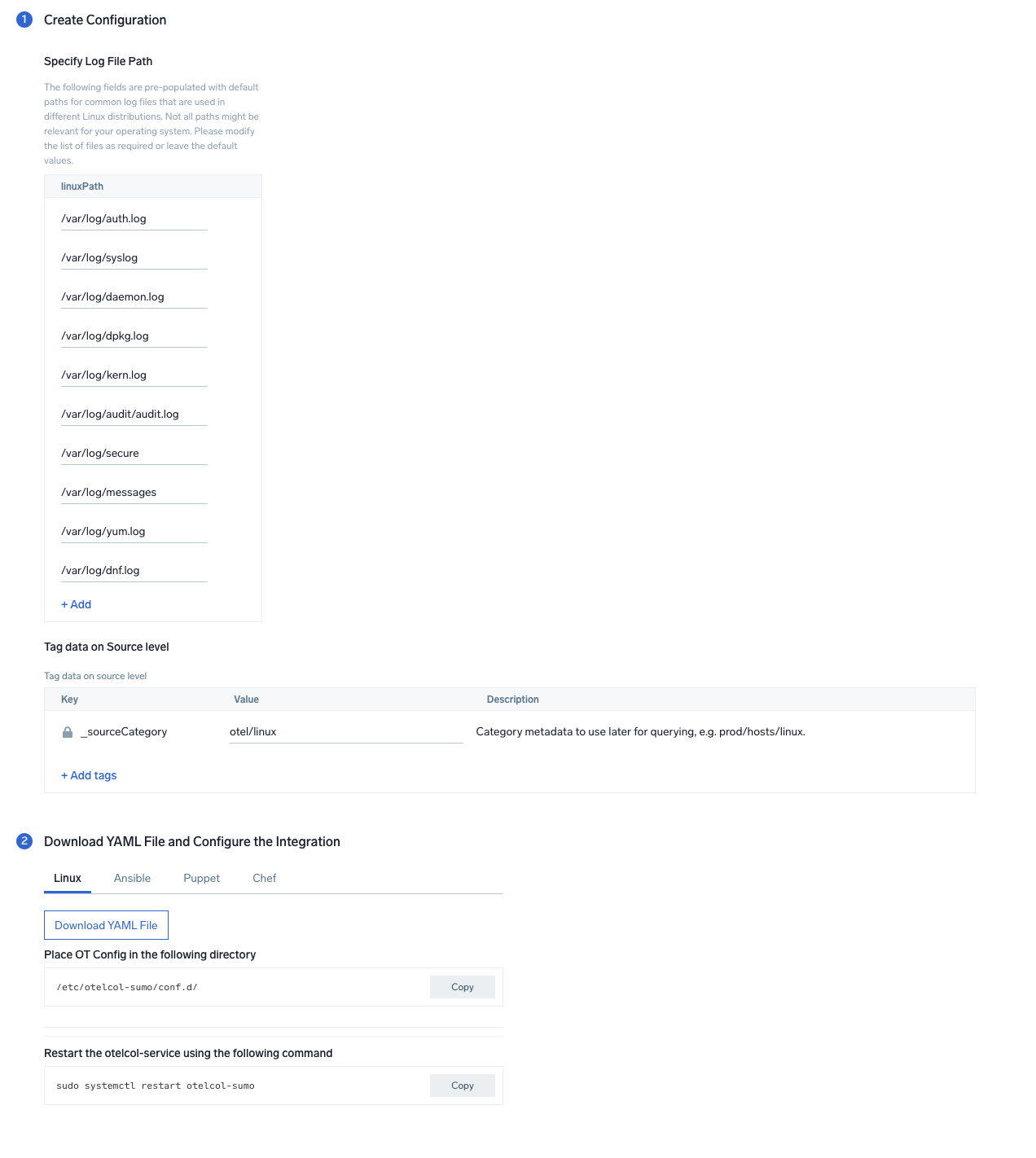
By default, the path for Linux log files required for all the distros are pre-populated in the UI. (Optional) Unwanted file paths can be removed from the list if the files are not available on your Linux distribution. The collection will work even if not all the files are present in your system.
Step 3: Send logs to Sumo Logic
Once you have downloaded the YAML file as described in the previous step, follow the below steps based on your platform.
- Linux
- Chef
- Ansible
- Puppet
- Copy the YAML file to
/etc/otelcol-sumo/conf.d/folder in the Linux instance which needs to be monitored. - Restart the collector using:
sudo systemctl restart otelcol-sumo
- Copy the yaml file into your Chef cookbook files directory
files/<downloaded_yaml_file>. - Use a Chef file resource in a recipe to manage it.
cookbook_file '/etc/otelcol-sumo/conf.d/<downloaded_yaml_file>' do mode 0644 notifies :restart, 'service[otelcol-sumo]', :delayed end - Add the recipe to your collector setup to start collecting the data. Every team typically has their established way of applying the Chef recipe. The resulting Chef recipe should look something like:
cookbook_file '/etc/otelcol-sumo/conf.d/<downloaded_yaml_file>' do
mode 0644
notifies :restart, 'service[otelcol-sumo]', :delayed
end
- Place the file into your Ansible playbook files directory.
- Run the Ansible playbook.
ansible-playbook -i inventory install_sumologic_otel_collector.yaml
-e '{"installation_token": "<YOUR_TOKEN>", "collector_tags": {<YOUR_TAGS>}, "src_config_path": "files/conf.d"}'
- Place the file into your Puppet module files directory
modules/install_otel_collector/files/<downloaded_yaml>. - Use a Puppet file resource to manage it.
file { '/etc/otelcol-sumo/conf.d/<downloaded_yaml_file>':
ensure => present,
source => 'puppet:///modules/install_otel_collector/<downloaded_yaml_file>',
mode => '0644',
notify => Service[otelcol-sumo],
} - Apply the Puppet manifest. Every team typically has their established way of applying the Puppet manifest. The resulting Puppet manifest should look something like:
node 'default' {
class { 'install_otel_collector'
installation_token => '<YOUR_TOKEN>',
collector_tags => { <YOUR_TAGS> },
}
service { 'otelcol-sumo':
provider => 'systemd',
ensure => running,
enable => true,
require => Class['install_otel_collector'],
}
file { '/etc/otelcol-sumo/conf.d/<downloaded_yaml_file>':
ensure => present,
source => 'puppet:///modules/install_otel_collector/<downloaded_yaml_file>',
mode => '0644',
notify => Service[otelcol-sumo],
}
}
After successfully executing the above command, Sumo Logic will start receiving data from your host machine.
Click Next. This will install the app (dashboards and monitors) to your Sumo Logic Org.
Dashboard panels will start to fill automatically. It's important to note that each panel fills with data matching the time range query and received since the panel was created. Results won't immediately be available, but within 20 minutes, you'll see full graphs and maps.
Sample log messages
Jun 28 07:46:03 bruno-supercomputer useradd[1602]: new account added - account=root1, uid=1002, gid=100, home=/home/root1, shell=/bin/bash, by=0
Sample queries
sumo.datasource=linux deployment.environment=* host.group=* host.name=* "useradd" and ("new user" or "new account")
| parse regex "\S*\s+\d+\s+\d+:\d+:\d+\s+(?<_sourceHost>\S+)\s+\w*" nodrop
| parse regex "\S*\s+\d+\s+\d+:\d+:\d+\s+(?<dest_host>\S*)\s+(?<process>\w*)(?:\[\d+\]:|:)\s*(?<msg>.+)$" nodrop
| parse field=msg "name=*, UID=" as dest_user nodrop
| parse field=msg "name=*, UID=*, GID=*, home=*, shell=*" as dest_user, UID, GID, home, shell nodrop
| parse field=msg ", shell=*\"" as shell nodrop
| parse field=msg "account=*, uid=*, gid=*, home=*, shell=*" as dest_user, UID, GID, home, shell nodrop
| parse field=msg "account=*, uid=" as dest_user nodrop
| "Local Server" as type | _sourceHost as dest_ip
| timeslice 15m
|where if ("{{dest_host}}" = "*", true, dest_host matches "{{dest_host}}") AND if ("{{dest_user}}" = "*", true, dest_user matches "{{dest_user}}") AND if ("{{process}}" = "*", true, process matches "{{process}}")
|count as eventCount by _timeslice, dest_host, dest_user, process, UID, GID, home, shell, type
| fields -eventCount
| sort by _timeslice
Viewing PCI Compliance for Linux dashboards
All dashboards have a set of filters that you can apply to the entire dashboard. Use these filters to drill down and examine the data to a granular level.
- You can change the time range for a dashboard or panel by selecting a predefined interval from a drop-down list, choosing a recently used time range, or specifying custom dates and times. Learn more.
- If required, configure the refresh interval rate for a dashboard or panel by clicking the drop-down arrow next to the refresh icon.
- Click the funnel icon in the dashboard top menu bar to filter dashboard with Template Variables.

Account, User, System Monitoring
The PCI Compliance for Linux - PCI Requirements 02, 07, 08, 10 - Account, User, System Monitoring dashboard meets PCI Requirements 02, 07, 08 and 10 by monitoring user accounts and services. This dashboard provides information about user accounts created and deleted, stopped services, running services, and active services over time.
Use this dashboard to:
- Monitor administrative actions (create and delete users) performed by end users.
- Ensure proper services are running on all systems.
- Detect attempts to change the system time.
- Verify the status of critical systems.
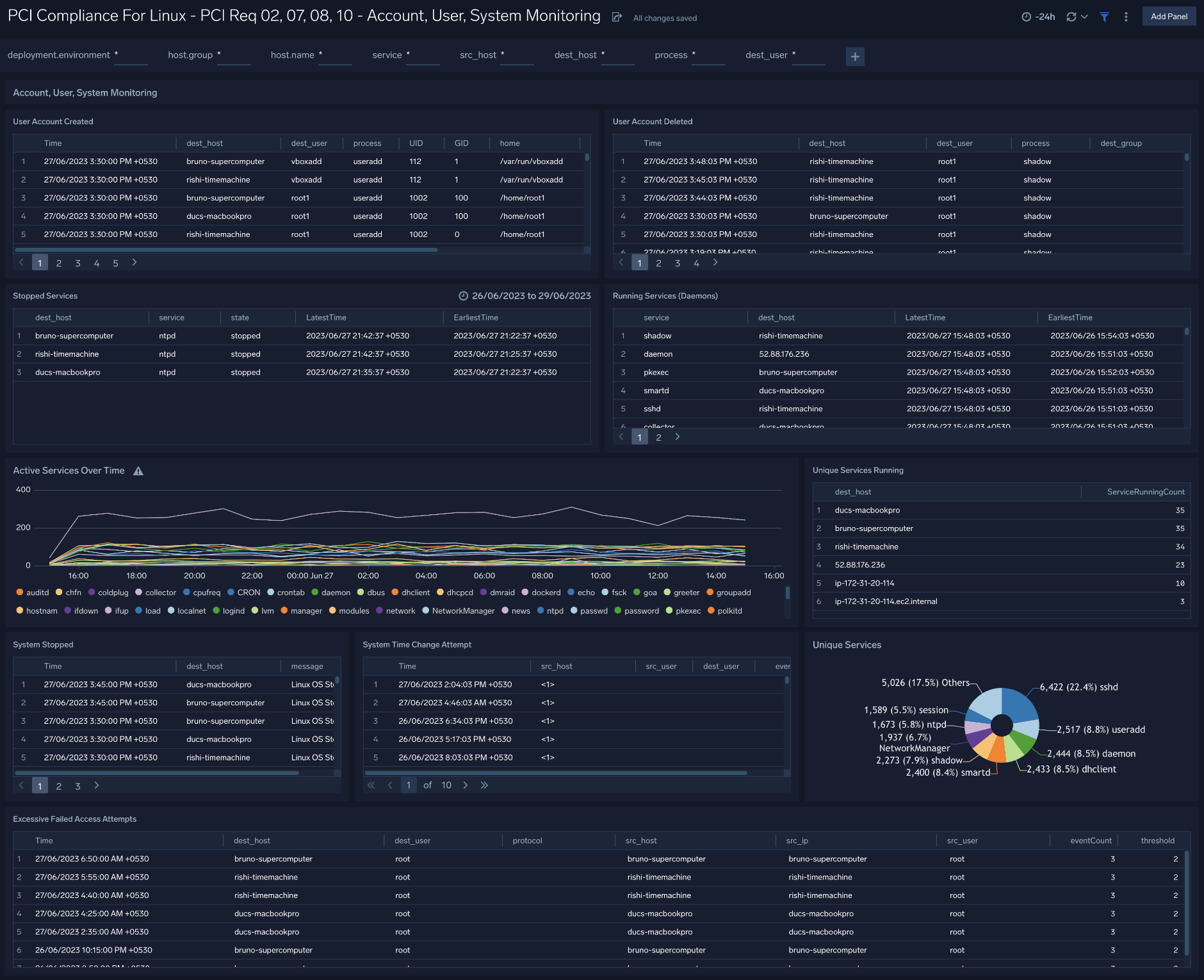
Login Activity
The PCI Compliance for Linux - PCI Requirements 02, 10 - Login Activity dashboard meets PCI Requirements 02 and 10 by tracking login activity. This dashboard provides information about failed and successful logins of users and super-user.
Use this dashboard to:
- Monitor access to the cardholder data environment.
- Monitor failed and successful user logins.
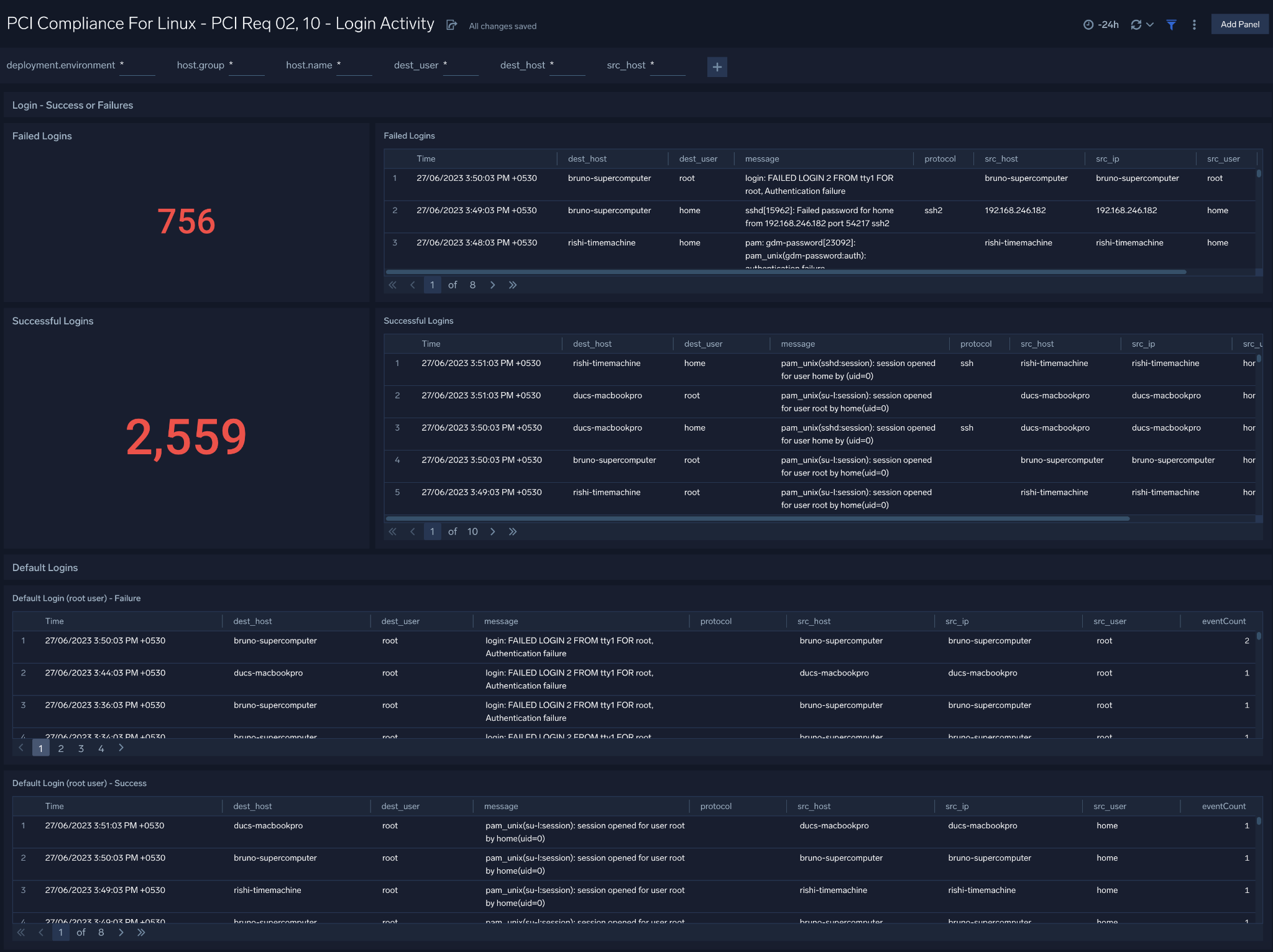
Privileged Activity
The PCI Compliance for Linux - PCI Requirements 10 - Privileged Activity dashboard meets PCI Requirement 10. This dashboard provides information about total sudo attempts, failed sudo attempts, top 10 users and hosts that have issued sudo attempts, recent sudo attempts, and sudo attempts over time.
Use this dashboard to:
- Monitor successful and failed access attempts to systems with administrative privileges.
- Monitor actions performed by users with administrative privileges.
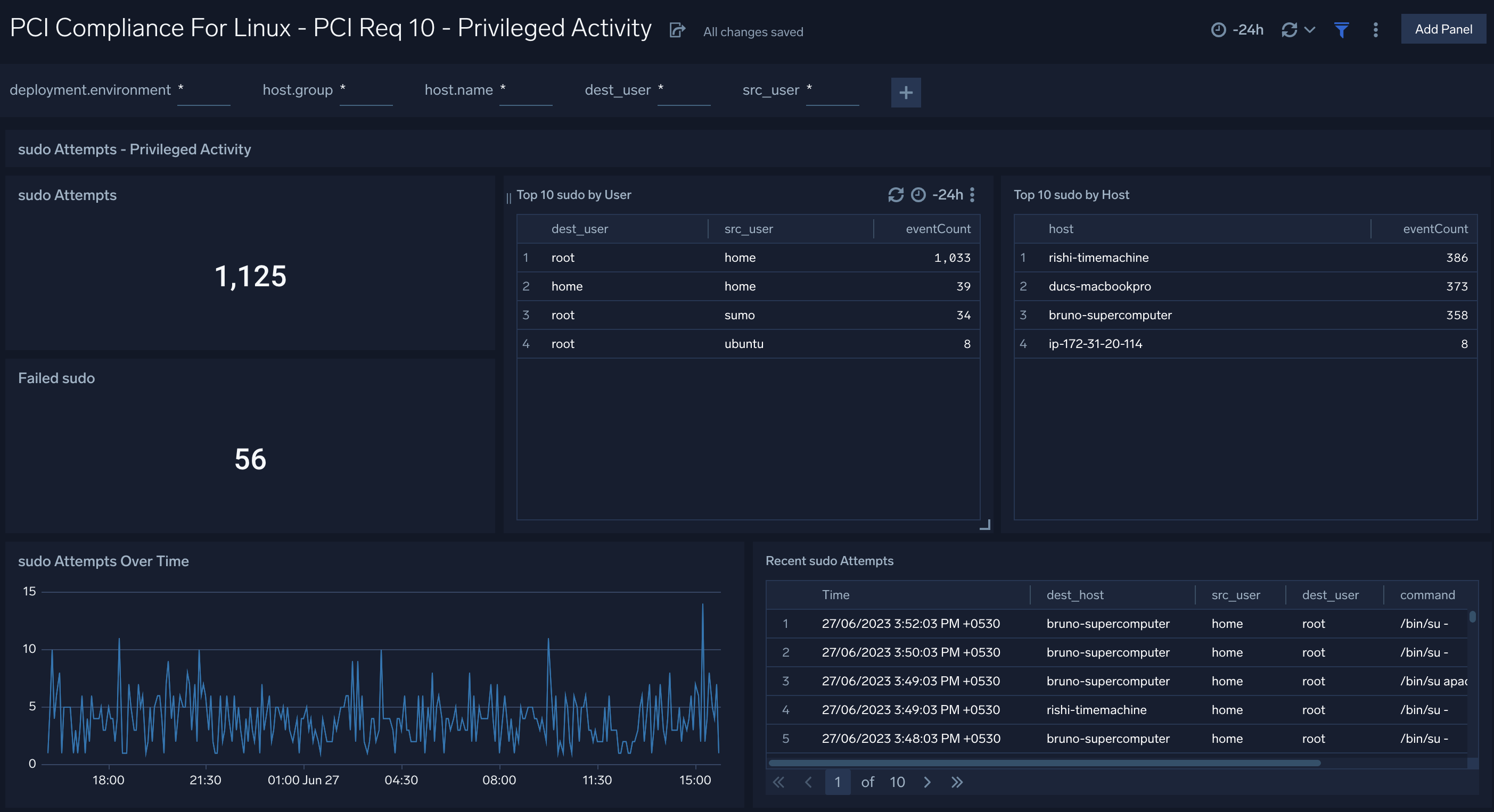
Create monitors for PCI Compliance for Linux app
From your App Catalog:
- From the Sumo Logic navigation, select App Catalog.
- In the Search Apps field, search for and then select your app.
- Make sure the app is installed.
- Navigate to What's Included tab and scroll down to the Monitors section.
- Click Create next to the pre-configured monitors. In the create monitors window, adjust the trigger conditions and notifications settings based on your requirements.
- Scroll down to Monitor Details.
- Under Location click on New Folder.
note
By default, monitor will be saved in the root folder. So to make the maintenance easier, create a new folder in the location of your choice.
- Enter Folder Name. Folder Description is optional.
tip
Using app version in the folder name will be helpful to determine the versioning for future updates.
- Click Create. Once the folder is created, click on Save.
PCI Compliance for Linux alerts
| Name | Description | Alert Condition | Recover Condition |
|---|---|---|---|
PCI Linux - Excessive Failed Authentication | This alert is triggered when multiple failed login attempts are detected over a 5-minute period, indicating potential brute force attempts and addressing PCI Requirement 10.2.4 for invalid logical access attempts. | Count > 5 | Count < = 5 |
PCI Linux - Privileged User Account Changes | This alert is triggered when privileged user accounts (UID < 1000 or root accounts) are created, deleted, or modified, addressing PCI Requirement 10.2.5 for changes to identification and authentication mechanisms. | Count > 0 | Count < = 0 |
PCI Linux - Unauthorized Sudo Elevation | This alert is triggered when unauthorized users attempt to use sudo is detected, which addresses PCI Requirement 7.2.0 for implementing an access control system among system components with multiple users. | Count > 2 | Count < = 2 |